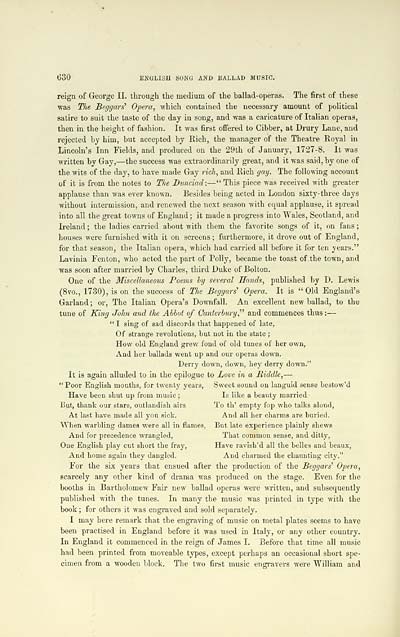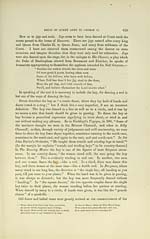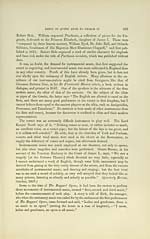Glen Collection of printed music > Printed text > Popular music of the olden time > Volume 2
(254) Page 630
Download files
Complete book:
Individual page:
Thumbnail gallery: Grid view | List view

t!30 ENGLISH SONG AND BALLAD MUSIC.
reign of George II. through the medium of the ballad-operas. The first of these
was Tlie Beggars' Opera, which contained the necessary amount of political
satire to suit the taste of the day in song, and was a caricature of Italian operas,
then in the height of fashion. It was first offered to Cibber, at Drury Lane, and
rejected by him, but accepted by Rich, the manager of the Theatre Royal in
Lincoln's Inn Fields, and produced on the 29th of January, 1727-8. It was
written by Gay, — the success was extraordinarily great, and it was said, by one of
the wits of the day, to have made Gay rich, and Rich gay. The following account
of it is from the notes to Tlie Dunciad: — " This piece was received with greater
applause than was ever known. Besides being acted in London sixty-three days
without intermission, and renewed the next season with equal applause, it spread
into all the great towns of England ; it made a progress into Wales, Scotland, and
Ireland ; the ladies carried about with them the favorite songs of it, on fans ;
houses were furnished with it on screens ; furthermore, it drove out of England,
for that season, the Italian opera, which had carried all before it for ten years."
Lavinia Fenton, who acted the part of Polly, became the toast of the town, and
was soon after married by Charles, third Duke of Bolton.
One of the Miscellaneous Poems by several Hands, published by D. Lewis
(8vo., 1730), is on the success of The Beggars' Opera. It is "Old England's
Garland ; or, The Italian Opera's Downfall. An excellent new ballad, to the
tune of King John and the Abbot of Canterbury'' and commences thus : —
" I sing of sad discords that happened of late,
Of strange revolutions, but not in the state ;
How old England grew fond of old tunes of her own,
And her ballads went up and our operas down.
Derry down, down, hey derry down."
It is again alluded to in the epilogue to Love in a Middle, —
" Poor English mouths, for twenty years, Sweet sound on languid sense bestow'd
Have been shut up from music ; Is like a beauty married-
But, thank our stars, outlandish airs To th' empty fop who talks aloud,
At last have made all you sick. And all her charms are buried.
When warbling dames were all in flames, But late experience plainly shews
And for precedence wrangled, That common sense, and ditty,
One English play cut short the fray, Have ravish'd all the belles and beaux,
And home again they dangled. And charmed the chaunting city."
For the six years that ensued after the production of the Beggars' Opera,
scarcely any other kind of drama was produced on the stage. Even for the
booths in Bartholomew Fair new ballad operas were written, and subsequently
published with the tunes. In many the music was printed in type with the
book ; for others it was engraved and sold separately.
I may here remark that the engraving of music on metal plates seems to have
been practised in England before it was used in Italy, or any other country.
In England it commenced in the reign of James I. Before that time all music
had been printed from moveable types, except perhaps an occasional short spe-
cimen from a wooden block. The two first music engravers were William and
reign of George II. through the medium of the ballad-operas. The first of these
was Tlie Beggars' Opera, which contained the necessary amount of political
satire to suit the taste of the day in song, and was a caricature of Italian operas,
then in the height of fashion. It was first offered to Cibber, at Drury Lane, and
rejected by him, but accepted by Rich, the manager of the Theatre Royal in
Lincoln's Inn Fields, and produced on the 29th of January, 1727-8. It was
written by Gay, — the success was extraordinarily great, and it was said, by one of
the wits of the day, to have made Gay rich, and Rich gay. The following account
of it is from the notes to Tlie Dunciad: — " This piece was received with greater
applause than was ever known. Besides being acted in London sixty-three days
without intermission, and renewed the next season with equal applause, it spread
into all the great towns of England ; it made a progress into Wales, Scotland, and
Ireland ; the ladies carried about with them the favorite songs of it, on fans ;
houses were furnished with it on screens ; furthermore, it drove out of England,
for that season, the Italian opera, which had carried all before it for ten years."
Lavinia Fenton, who acted the part of Polly, became the toast of the town, and
was soon after married by Charles, third Duke of Bolton.
One of the Miscellaneous Poems by several Hands, published by D. Lewis
(8vo., 1730), is on the success of The Beggars' Opera. It is "Old England's
Garland ; or, The Italian Opera's Downfall. An excellent new ballad, to the
tune of King John and the Abbot of Canterbury'' and commences thus : —
" I sing of sad discords that happened of late,
Of strange revolutions, but not in the state ;
How old England grew fond of old tunes of her own,
And her ballads went up and our operas down.
Derry down, down, hey derry down."
It is again alluded to in the epilogue to Love in a Middle, —
" Poor English mouths, for twenty years, Sweet sound on languid sense bestow'd
Have been shut up from music ; Is like a beauty married-
But, thank our stars, outlandish airs To th' empty fop who talks aloud,
At last have made all you sick. And all her charms are buried.
When warbling dames were all in flames, But late experience plainly shews
And for precedence wrangled, That common sense, and ditty,
One English play cut short the fray, Have ravish'd all the belles and beaux,
And home again they dangled. And charmed the chaunting city."
For the six years that ensued after the production of the Beggars' Opera,
scarcely any other kind of drama was produced on the stage. Even for the
booths in Bartholomew Fair new ballad operas were written, and subsequently
published with the tunes. In many the music was printed in type with the
book ; for others it was engraved and sold separately.
I may here remark that the engraving of music on metal plates seems to have
been practised in England before it was used in Italy, or any other country.
In England it commenced in the reign of James I. Before that time all music
had been printed from moveable types, except perhaps an occasional short spe-
cimen from a wooden block. The two first music engravers were William and
Set display mode to: Large image | Transcription
Images and transcriptions on this page, including medium image downloads, may be used under the Creative Commons Attribution 4.0 International Licence unless otherwise stated. ![]()
| Special collections of printed music > Glen Collection of printed music > Printed text > Popular music of the olden time > Volume 2 > (254) Page 630 |
|---|
| Permanent URL | https://digital.nls.uk/91365042 |
|---|
| Shelfmark | Glen.254a |
|---|---|
| Additional NLS resources: | |
| Attribution and copyright: |
|
| Description | Scottish songs and music of the 18th and early 19th centuries, including music for the Highland bagpipe. These are selected items from the collection of John Glen (1833 to 1904). Also includes a few manuscripts, some treatises, and other books on the subject. |
|---|
| Description | The Glen Collection and the Inglis Collection represent mainly 18th and 19th century Scottish music, including Scottish songs. The collections of Berlioz and Verdi collected by bibliographer Cecil Hopkinson contain contemporary and later editions of the works of the two composers Berlioz and Verdi. |
|---|

